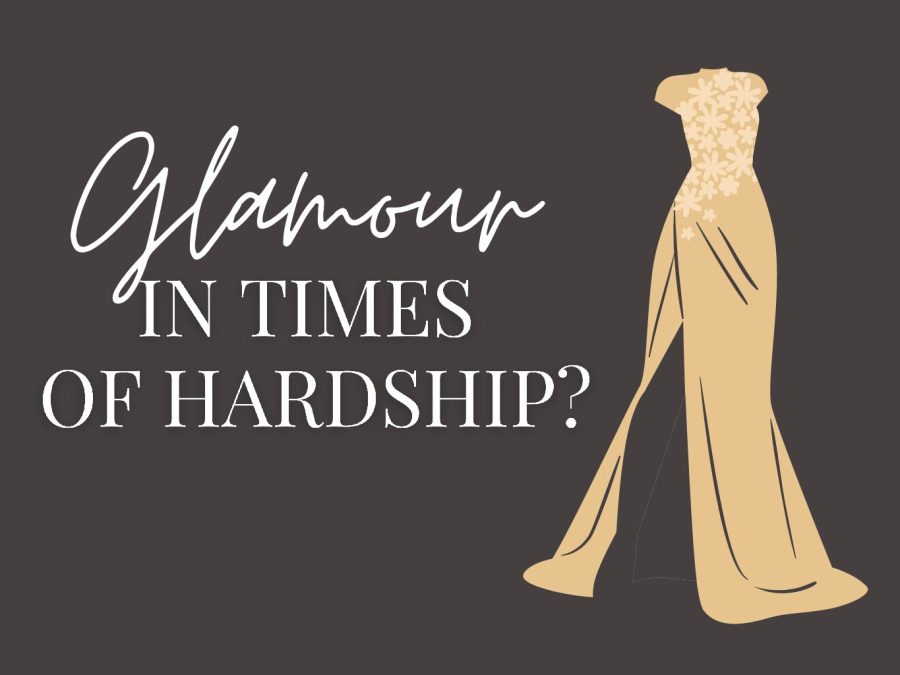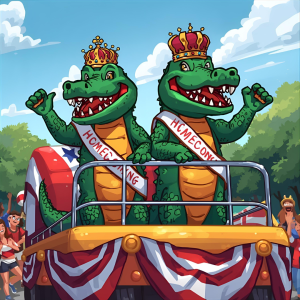The 2022 Met Gala Theme is Met With Criticism in Light of Economic Struggle
With a pandemic, war, and rising inflation rates in our wake, some wonder if Gilded Glamour is appropriate as the Met Gala theme this year. Graphic by K. Peechu.
May 6, 2022
The 2022 Met Gala’s “Gilded Glamour” theme was met with criticism amidst skyrocketing grocery and gas prices and struggling Americans.
The theme serves as a continuation of last year’s “In America: A Lexicon of Fashion”-themed gala, boasting “In America: An Anthology of Fashion.” While the two names sound similar, the latter is all about the Gilded Age in American history, a period from 1870 to 1890.
The term “Gilded Age” was coined by Mark Twain to denote a time of prosperity and growth in the industrialization age. From the lightbulb to the telephone to mass textile production that led to an abundance of frills, bows, and other decorative clothing additions, the period could be summed up by one word: excess. The economy boomed, with families such as the Roosevelts, the Vanderbilts, and the Rockefellers acquiring copious amounts of wealth. However, despite the lavish, bordering on superfluous lifestyle of the era’s elite, millions were incredibly poor and could just barely make ends meet, if at all.
Several celebrities took this theme to dress in the glamorous way of the Gilded Age high class—but the theme has rubbed several people the wrong way.
Many find the theme “Gilded Glamour” “tone-deaf” and “out-of-touch” in our current economic state, where income inequality is the highest it’s been since the 1970s and inflation rates are the highest they’ve been since the 1980s. Furthermore, the U.S. economy actually shrank by 1.4% in the most recent quarter, the first time since the recession two years ago that struck the country due to the pandemic.
A Twitter user said, “Am I the only one who thinks this years Met Gala theme is out of touch? Inequality is at the highest levels since the Gilded Age, a pandemic and economic meltdown wrecked us, inflation is out of control… but cool, let’s wear Gilded Age themed dresses and laugh about inequality.” They added, “To be clear, I’m normally a big fan. But this year’s theme is a slap in the face to average Americans.”
Am I the only one who thinks this years #MetGala theme is out of touch? inequality is at the highest levels since the Gilded Age, a pandemic & economic meltdown wrecked us, inflation is out of control… but cool, let’s wear #GildedAge themed dresses & laugh about inequality
— Kelsea Marie Pym (@KelseaMariePym) April 30, 2022
“It’s too-on-the-nose for the Met Gala to have a ‘Gilded Age’ theme on the same day we know the US economy is contracting,” tweeted a Business Insider reporter.
Another user brought up another point of criticism some have found about the Met Gala, which is that the theme is insensitive in a time of war between Russia-Ukraine, responding to a tweet about the Met Gala with, “Gilded glamour at a time of war, let them eat cake.”
Gilded glamour at a time of war, let them eat cake
— bryanboy (@bryanboy) March 17, 2022
Piers Morgan summed up the theme’s controversy with, “This year’s ‘gilded theme’ Met Gala, held amid the backdrop of war, pandemic and ruinous inflation, is the most tone-deaf, self-indulgent, narcissistic, hideously inappropriate ‘let them eat cake!’…in modern history.”
Some took advantage of the theme to recognize marginalized groups in the Gilded Age. Gabrielle Union donned a Versace gown with a feathery train and an oversized red bloom on her waist in an homage to the unrecognized Black Americans of the Gilded Age and their “blood, sweat, and tears” that helped build the country. She stated, “So we added these red crystals to represent the blood spilled during the accumulation of gross wealth by a few during the Gilded Age, off of the backs of Black people and people of color in this country.” She mentioned that the look also honored the late Diahann Carroll, one of the first Black actresses to star in a primetime sitcom.
Riz Ahmed, dressed in a navy silk shirt, high boots, and an “understated” Cartier necklace, honored the Gilded Age’s immigrant workers who “kept [it] golden.”
“It’s what makes the city run,” he said about the immigrant workers’ efforts that were and still are an integral part of the success of metropolitan areas such as New York City. “Just trying to celebrate and elevate that immigrant culture.”







